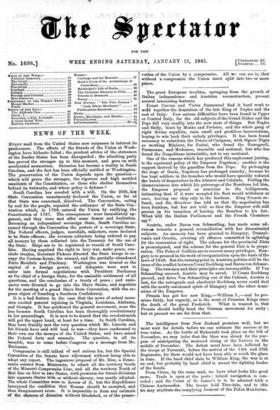The great European troubles, springing from the growth of Italian
independence and Austrian reconstruction, present several interesting features.
Count Cavour and Victor Emmanuel find it hard work to weld together the dominions of the late King of Naples and the rest of Italy. Few serious difficulties have been found in Upper or Central Italy, for the old subjects of the Grand Dukes and the Pope fall very readily into the new state of things. But Naples and Sicily, beset by Monks and Prelates, and the whole gang of right divine royalists, raise small and profitless insurrections, hoping to win back their unholy privileges. It has been found necessary to substitute the Prince of Carignan, with Signor Nigra as working Minister, for Farini, who found the Romagnoli, Parmesans, and Modenese, tractable and national, but who has found the Neapolitans intractable, not to say sectional.
One of the reasons which has produced this unpleasant jarring, is the equivocal policy of the Emperor Napoleon ; another is the support derived by the guerillas from the Pope. By prolonging the siege of Gaeta, Napoleon has prolonged anarchy, because he has kept soldiers in the trenches who would have speedily reduced the bands of desperadoes in the Abruzzi and Calabria. Feeling the inconveniences into which his patronage of the Bourbons led him, the Emperor proposed an armistice to the belligerents, intimating that if it were accepted his fleet would withdraw at once, leaving one ship only in the harbour. King Francis re- fused, and the Moniteur has told us that the negotiation has been fruitless, but has not told us that the Emperor persist in his intention of leaving the Bourbon to his fate. What will the Italian Parliament and the French Chambers say Austria, under Baron von Schmerling, has made some ad- vance towards a general reconciliation with her discontented subjects. An amnesty has been granted to Hungary, Transyl- vania and Croatia, covering all offences committed in agitating for the restoration of right. The scheme for the provincial Diets is promulgated, and the scheme for the general Diet is in prepa- ration. The Poles of Gallicia are to recover many privileges. Hun- gary is to proceed in the work of reorganization upon the basis of the laws of 1848. But the turning point in Austrian politics will be the issue of the conflict between Count Rechberg and Baron von Schmer- ling. The two men and their principles are incompatible. If Von Schmerling succeed, Austria may be saved. If Count Rechberg prevail, and drive Von Schmerling out of the Cabinet, Austria is lost, for the retrograde and absolutist Rechberg never could deal with the newly-awakened spirit of Hungary and the other domi- nions of the Emperor.
Prussia has got her new King,—William I.,—and he pro- mises fairly, but vaguely, as is the wont of Prussian Kings since the death of the great Frederick. What is wanted is, that Prussia should boldly head the German movement for unity ; but at present we are far from that.


























